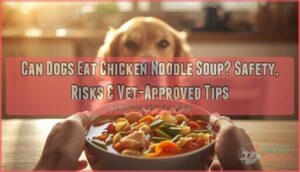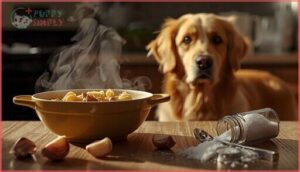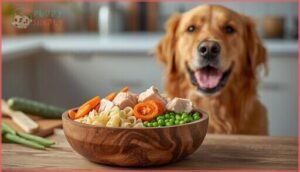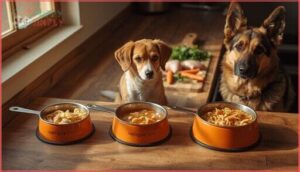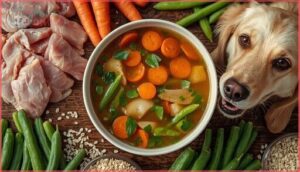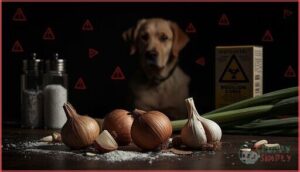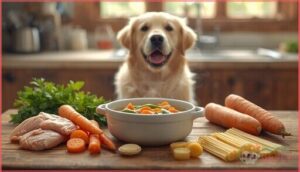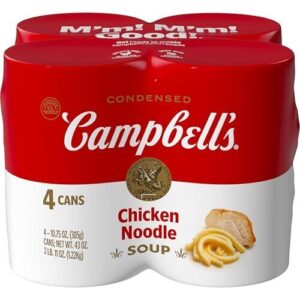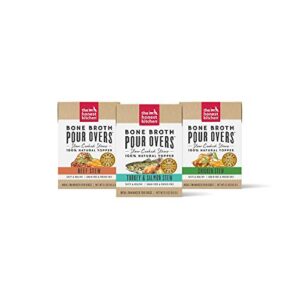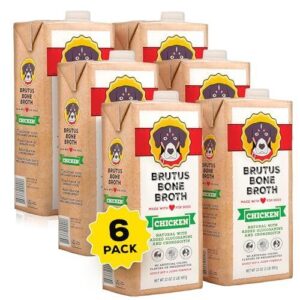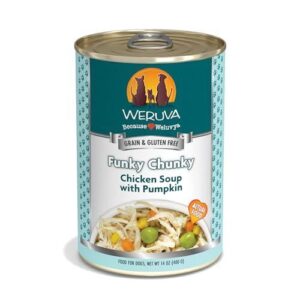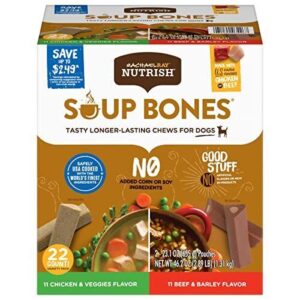This site is supported by our readers. We may earn a commission, at no cost to you, if you purchase through links.
That innocent-looking bowl of chicken noodle soup on your counter might seem like a comforting treat for your furry friend, but what appears harmless to us can spell serious trouble for dogs. While the chicken and vegetables sound nutritious enough, most store-bought versions pack a dangerous punch of sodium, onions, and garlic—ingredients that can damage your dog’s red blood cells and send their blood pressure skyrocketing.
The difference between a safe meal and a veterinary emergency often comes down to what’s hiding in that broth. Understanding which ingredients help and which harm your pup means you can make informed choices about sharing soup—or better yet, whipping up a dog-safe version that delivers comfort without the risk.
Table Of Contents
- Key Takeaways
- Can Dogs Eat Chicken Noodle Soup?
- Harmful Ingredients in Chicken Noodle Soup
- Safe Ingredients and Nutritional Benefits
- Portion Control and Feeding Guidelines
- Making Dog-Friendly Chicken Noodle Soup at Home
- Top 5 Chicken Soup and Broth Products for Dogs
- Frequently Asked Questions (FAQs)
- Is it okay to give your dog chicken noodle soup?
- What soups are safe for dogs?
- Can I give my dog Lipton chicken noodle soup?
- Is it okay for dogs to have chicken noodle soup?
- Is chicken soup good for dogs with upset stomach?
- Can dogs have chicken broth from soup?
- Is soup good for sick dogs?
- What are the benefits of homemade chicken noodle soup for dogs?
- How much is too much chicken noodle soup for my dog?
- What are the risks of store-bought soup for dogs?
- Conclusion
Key Takeaways
- Store-bought chicken noodle soup is dangerous for dogs due to high sodium levels (often 600-890mg per cup) and toxic ingredients like onion and garlic powder that damage red blood cells and cause anemia.
- Homemade versions using plain, unsalted chicken breast, safe vegetables like carrots and green beans, and plain noodles can provide hydration and protein without the risks of commercial soups.
- Portion size matters significantly—toy breeds should only receive 1-2 tablespoons, while even large breeds shouldn’t exceed half a cup daily, treating soup as an occasional topper rather than a meal replacement.
- Dog-specific bone broths and toppers offer safer alternatives to human soup, providing hydration and palatability without harmful additives, though you’ll still need to check labels for sodium content and toxic ingredients.
Can Dogs Eat Chicken Noodle Soup?
The short answer is yes, dogs can eat chicken noodle soup—but it depends entirely on what’s in the bowl. Store-bought versions often contain ingredients that can make your dog sick, while homemade soup made with safe ingredients can be a healthy treat.
If you’re planning to use leftover chicken, just make sure it’s plain and safe—dogs can eat frozen chicken as long as it’s boneless and free from seasonings.
Let’s look at the key differences, risks, and when this comfort food crosses the line from safe to harmful.
Risks of Feeding Dogs Human Soups
Human soups pose real dangers to your pup’s health. Even small servings can introduce toxic ingredients, trigger food allergies, or cause digestive issues that compromise canine health.
Here’s what threatens your dog’s food safety:
- High sodium raises blood pressure and causes dehydration
- Onions and garlic damage red blood cells leading to food toxicity
- Hidden preservatives irritate digestion and worsen pet nutrition
- Dairy fats trigger vomiting in lactose-intolerant dogs
Understanding toxicity in dogs helps you avoid feeding human food for dogs that seems harmless but isn’t.
For a deeper look at safe soup ingredients for dogs, consult reliable canine nutrition resources.
Differences Between Canned and Homemade Versions
Store-bought canned soup packs a one-two punch: sky-high sodium content and hidden toxic ingredients like onion powder. A single cup can blow past your dog’s daily sodium levels, risking dehydration and worse.
Homemade soup flips the script—you control every ingredient, skip the garlic, and tailor nutrition value to your pup’s needs. This broth comparison reveals why homemade safety beats canned risks every time.
When is Chicken Noodle Soup Unsafe for Dogs?
Your dog can’t safely eat soup when salt toxicity or garlic poisoning lurk in the bowl. Sodium overload triggers vomiting and seizures—one half-cup of canned soup often exceeds safe limits.
Onion and garlic damage red blood cells, causing anemia. Watch for toxic ingredients in dog food labels too.
Digestive issues from additives signal trouble, especially if your pup has canine allergies. Dogs can experience severe health problems from onion and garlic toxicity.
Harmful Ingredients in Chicken Noodle Soup
Not all ingredients in chicken noodle soup are safe for your dog, even if they seem harmless to us. Some can cause serious health problems, from stomach upset to life-threatening poisoning.
Let’s look at the three biggest culprits you need to watch out for.
Sodium and Salt Toxicity Risks
You mightn’t realize that even a small bowl of salty soup can send your dog’s sodium levels dangerously high.
Salt toxicity symptoms include vomiting, tremors, and seizures—signs that your pup’s electrolyte balance is off.
Most canned soups pack far more sodium content than dogs can handle safely, threatening canine hydration and overall pet food safety.
Onion and Garlic Poisoning in Dogs
Even trace amounts of onions and garlic trigger hemolytic crisis in your dog—a serious canine anemia that destroys red blood cells.
Even tiny amounts of onions and garlic can trigger hemolytic crisis in dogs, destroying red blood cells and causing serious anemia
Garlic poisoning symptoms appear within 24 hours to 7 days and include:
- Vomiting and diarrhea as early toxicity symptoms
- Pale gums indicating worsening anemia
- Dark urine from red blood cell breakdown
- Weakness and rapid breathing
These toxic ingredients pose life-threatening dog health risks.
Preservatives and Additives to Avoid
Beyond onion and garlic, canned soups contain preservatives that threaten your dog’s health. Monosodium glutamate can trigger headaches, while sodium phosphate strains kidneys already taxed by excessive sodium content.
| Toxic Ingredients | Harmful Substances & Risks |
|---|---|
| Monosodium glutamate | Headaches, flushing in sensitive dogs |
| Sodium benzoate | Digestive upset, allergic reactions |
| BHA/BHT | Potential cancer concerns long-term |
| Disodium inosinate | Amplifies MSG sensitivity effects |
| Potassium sorbate | Skin irritation, gut discomfort |
These chemical toxins and food additives make commercial soups dangerous—even small servings carry preservative risks.
Safe Ingredients and Nutritional Benefits
When you strip away the risky additives and sodium overload, chicken noodle soup actually contains several ingredients that can benefit your dog’s health.
The key is understanding which components offer real nutritional value and how they support your pet’s wellbeing. Let’s break down the safe ingredients that make homemade versions a potentially healthy option for your furry friend.
Protein From Chicken for Dogs
When your dog’s recovering from an upset stomach or needs a gentle protein boost, chicken stands out as one of the most reliable protein sources in canine nutrition. White meat delivers all essential amino acids necessary for dog muscle repair and immune support, making it a cornerstone of chicken noodle soup’s nutritional value.
- High-quality protein: Chicken breast provides complete amino acids for tissue repair and growth in dogs
- Digestible and gentle: Boneless skinless chicken is easy on sensitive stomachs while supporting canine health
- Nutrient-rich profile: Beyond protein, chicken offers B vitamins and minerals that contribute to overall canine wellness and care
Role of Noodles and Vegetables
While chicken delivers the protein punch, noodles and vegetables round out chicken noodle soup’s nutritional profile—though not all ingredients earn equal marks. Plain noodles offer quick energy as carbohydrate sources, but they won’t dramatically improve your dog’s diet. Vegetable fiber from carrots and celery aids digestion and adds vitamins A and C, provided you’ve skipped the onion and garlic entirely.
When crafting homemade soup, focus on nutrient balance: pair soft noodle texture with finely chopped veggies to ease chewing while keeping sodium content minimal for ideal canine health.
| Ingredient | Nutritional Benefit | Safety Consideration |
|---|---|---|
| Plain Noodles | Energy from carbohydrates | Low fiber; choose whole grain when possible |
| Carrots | Beta-carotene, fiber, vitamins | Cook and chop small to prevent choking |
| Celery | Hydration benefits, low-calorie crunch | Remove stringy parts; serve in small pieces |
| Green Beans | Vegetable fiber, vitamins K and C | Plain only—no seasonings or butter |
| Sweet Potato | Complex carbs, antioxidants | Cooked thoroughly; avoid raw pieces |
Hydration and Mild Flavors for Sensitive Stomachs
When your pup battles an upset tummy, gentle rehydration through plain, unsalted broth can work wonders for fluid balance and stomach soothing. Here’s how to aid sensitive digestion safely:
- Use lukewarm, diluted chicken broth for electrolyte management without overwhelming delicate systems
- Start with 1–2 tablespoons for small dogs, sipping slowly to prevent nausea
- Skip strong spices that irritate stomach lining
- Monitor hydration over 12–24 hours, adjusting based on your dog’s comfort
This dog-friendly approach promotes canine health through measured, gentle care.
Portion Control and Feeding Guidelines
Even when you’re making dog-safe chicken noodle soup at home, you can’t just fill up your pup’s bowl and call it a day. The amount you serve depends on your dog’s size, and there’s a big difference between a Chihuahua’s portion and a German Shepherd’s.
Let’s break down exactly how much soup is safe, how often you can offer it, and what warning signs mean your dog’s had too much.
Recommended Serving Sizes by Dog Size
Your dog’s weight determines how much soup they can safely enjoy. Extra small portions—just 1–2 tablespoons—work for toy breeds, while small dog servings reach 2–3 tablespoons for 15-pounders.
Medium dog amounts increase to roughly 1 ounce per 10 pounds of body weight. Large breed canines may handle up to 10 ounces if they’re 100 pounds, though veterinary advice for dog owners emphasizes treating soup as a topper, never a meal replacement, ensuring dog food safety through careful pet nutrition and diet management based on dog size and individual dog health and nutrition needs.
How Often Can Dogs Have Chicken Noodle Soup?
Feeding frequency matters as much as serving size when you’re adding chicken noodle soup to your dog’s diet. Healthy adult pups tolerate dog-safe versions once or twice weekly, keeping treats under 10 percent of daily calories so vet-recommended food provides essential canine nutrition.
Plain, low-sodium broth appears more often than full soup, but daily noodle servings risk weight gain and sodium content overload—healthy portions mean occasional enjoyment, not routine meals.
Signs of Overconsumption or Adverse Reactions
Watch for vomiting symptoms or diarrhea within 6 to 12 hours—digestive issues signal stomach upset from rich fats or toxic ingredients like onion powder.
Excessive thirst, lethargy, or abdominal pain point to sodium content overload or food allergies.
Pale gums and rapid heart rate demand emergency care, so seek veterinary advice immediately if toxicity signs appear after your dog eats chicken noodle soup.
Making Dog-Friendly Chicken Noodle Soup at Home
Making chicken noodle soup at home gives you complete control over what goes into your dog’s bowl. You can skip the risky ingredients and focus on simple, nutritious options that support your pup’s health.
Here’s what to include, what to avoid, and how to prepare a vet-approved recipe your dog will love.
Ingredients to Include for Canine Health
Building a nutritious homemade soup starts with quality lean protein like skinless chicken breast, which delivers complete amino acids for muscle health. You’ll want to add soft-cooked carrots and green beans for fiber and beta-carotene, plus plain rice or oatmeal for gentle carbohydrates.
A splash of low-sodium broth enhances palatability while supporting hydration—key elements of balanced canine nutrition without unnecessary additives.
Ingredients to Strictly Avoid
Just as important as what you add is what you leave out. Onions and garlic—whether fresh, powdered, or dried—damage red blood cells and cause anemia, even in small doses.
Toxic ingredients you must skip include:
- All alliums: onions, garlic, leeks, chives
- Excessive sodium content: salt, bouillon cubes, seasoning packets
- Harmful spices and preservatives: BHA, BHT, artificial flavors
Deadly toxins hide in everyday pantry staples, so read labels carefully.
Simple Recipe and Preparation Tips
Boil boneless chicken in plain water for 15 to 20 minutes until fully cooked, then shred it into bite-sized pieces. Simmer dog-safe vegetables like carrots and green beans for an hour until very soft.
Add plain cooked noodles separately—no salt, butter, or seasonings. Cool the homemade soup to room temperature before serving to prevent burns.
Top 5 Chicken Soup and Broth Products for Dogs
If you’d rather skip the kitchen and reach for something off the shelf, there are dog-specific products designed with your pup’s health in mind.
Not all store-bought options are created equal, though—some are nutritionally sound, while others are just treats in disguise. Here are five popular chicken soup and broth products that can safely complement your dog’s diet.
1. Campbell’s Chicken Noodle Soup
Campbell’s Chicken Noodle Soup sits on shelves everywhere, but it’s not a safe choice for your dog. Each half-cup serving packs 890 milligrams of sodium—that’s 39 percent of a human’s daily limit, which can quickly overwhelm a smaller canine system.
Even more concerning, this soup contains onion powder and garlic extract, both toxic to dogs and linked to red blood cell damage over time. If your pup sneaks a lick, monitor for vomiting or excessive thirst, and contact your vet if symptoms worsen.
| Best For | Pet owners looking for a quick, nostalgic comfort food for themselves—but keep it away from your dog due to high sodium and toxic ingredients like onion and garlic. |
|---|---|
| Brand | Campbell’s |
| Primary Ingredient | Chicken |
| Form | Chunk |
| Target Age | All Ages |
| Made In | USA |
| Special Attributes | Non-BPA lined |
| Additional Features |
|
- Made with antibiotic-free chicken and quality egg noodles for a classic, comforting taste
- Easy to customize by adding fresh herbs, vegetables, or pairing with crackers and sandwiches
- Comes in recyclable, non-BPA-lined cans with about 2.5 servings per 10.75-ounce can
- Contains 890 mg of sodium per serving (39% of daily value), making it too salty for some people and unsafe for dogs
- Includes onion powder and garlic extract, which are toxic to pets and can cause red blood cell damage
- Packaging may arrive damaged, and you’ll need to check expiration dates before buying
2. Honest Kitchen Bone Broth Dog Topper
The Honest Kitchen Bone Broth Pour Overs offer a safer alternative to human soup, formulated specifically for dogs with real chicken or beef broth and whole-food ingredients like carrots and butternut squash. Each 5.5-ounce pouch contains human-grade protein without artificial preservatives, gums, or onion powder—those hidden hazards you’ll find in store-bought canned soups.
You can drizzle it over kibble to boost hydration and palatability, especially helpful for picky eaters. While it’s not a complete meal, it’s a trustworthy topper when your pup needs extra flavor.
| Best For | Dog owners looking for a nutritious, human-grade topper to make meals more appealing for picky eaters or to add hydration and protein to their dog’s diet. |
|---|---|
| Brand | The Honest Kitchen |
| Primary Ingredient | Beef/Chicken/Turkey |
| Form | Liquid Broth |
| Target Age | Adult |
| Made In | USA |
| Special Attributes | Human grade ingredients |
| Additional Features |
|
- Made with human-grade ingredients in a human food facility, free from artificial preservatives, gums, and questionable additives
- Provides extra hydration and protein while making kibble more appetizing for selective eaters
- Variety pack offers three different flavors (Beef, Chicken, and Turkey & Salmon) to keep things interesting
- Some customers have reported quality control issues with inconsistent texture or spoiled contents
- More expensive compared to other dog food toppers on the market
- May cause digestive upset or allergic reactions in some dogs, particularly those with sensitivities
3. Brutus Chicken Bone Broth for Dogs
Brutus Chicken Bone Broth goes beyond simple flavor profile—it’s fortified with glucosamine and chondroitin to support your dog’s joint health, making it especially valuable for senior pups or those recovering from injury.
With just 0.1% sodium and human-grade ingredients like turmeric for anti-inflammatory benefits, you can pour it over dry kibble without worrying about salt toxicity. The 32-ounce bottle makes dosing easy, though it’s pricier than basic broths and occasionally suffers from leakage issues during shipping.
| Best For | Senior dogs with joint issues or picky eaters who need extra nutrition and flavor to make their meals more appealing. |
|---|---|
| Brand | Native Pet |
| Primary Ingredient | Chicken |
| Form | Liquid |
| Target Age | Adult & Senior |
| Made In | USA |
| Special Attributes | Low sodium |
| Additional Features |
|
- Glucosamine and chondroitin support joint health, especially helpful for older dogs or those with mobility issues
- Human-grade, low-sodium formula (0.1%) with natural anti-inflammatory ingredients like turmeric
- Makes dry kibble more appetizing and can help with digestion or food allergies
- More expensive than basic bone broths on the market
- Packaging sometimes leaks during shipping
- Can be out of stock, and you need to watch expiration dates
4. Weruva Chicken Dog Food
Weruva Funky Chunky Chicken Soup stands out with its soupy texture—you’ll see actual chunks of boneless chicken breast, pumpkin, carrots, and green peas in gravy, not mystery meat paste. At roughly 8.69% protein and just 0.049% sodium as fed, it’s low in salt compared to typical human soups, reducing toxicity risk.
The brand uses cage-free chicken and produces food in human-grade facilities, with zero U.S. recalls through early 2026. It’s pricier than basic kibble, but quality shows.
| Best For | Dogs with food sensitivities who need a grain-free, low-fat option made with real chicken breast chunks instead of processed meat. |
|---|---|
| Brand | Weruva |
| Primary Ingredient | Chicken |
| Form | Wet |
| Target Age | Adult |
| Made In | Thailand |
| Special Attributes | Grain-free |
| Additional Features |
|
- Whole chicken breast pieces you can actually see, made in human-grade facilities with zero U.S. recalls
- Low sodium (0.049%) and grain-free formula works well for dogs with allergies or weight concerns
- Cage-free chicken sourced from Thailand under strict B.R.C. food safety standards
- Costs significantly more than standard wet food, with prices affected by tariffs
- Some cans arrive dented or damaged during shipping
- May cause loose stools in certain dogs during the adjustment period
5. Rachael Ray Nutrish Dog Chews
If your dog needs a chew rather than a soup, Rachael Ray Nutrish Soup Bones deliver real chicken flavor without the sodium spike of canned broth. Each bone contains no corn, soy, or artificial additives—just recognizable ingredients cooked in the USA.
They’re softer than rawhide but tough enough to satisfy moderate chewers. Small dogs may need pieces cut to size, and fast eaters won’t find them “long-lasting.” Still, they’re a cleaner alternative to messy bones, offering protein and dental engagement without risky seasonings.
| Best For | Dog owners looking for a safer, cleaner chew option with recognizable ingredients for moderate chewers of all sizes. |
|---|---|
| Brand | Nutrish |
| Primary Ingredient | Chicken/Beef |
| Form | Edible Chew |
| Target Age | All Life Stages |
| Made In | USA |
| Special Attributes | No artificial flavors |
| Additional Features |
|
- Made with real chicken or beef and no corn, soy, artificial flavors, or by-product meals
- USA-cooked with quality ingredients and supports animal welfare through The Rachael Ray Foundation
- Softer than rawhide but still provides dental engagement and satisfies chewing instincts
- Not long-lasting for aggressive chewers or dogs that eat quickly
- May be too large for small dogs and require cutting into smaller pieces
- Less durable than rawhide, so won’t work for dogs that need heavy-duty chews
Frequently Asked Questions (FAQs)
Is it okay to give your dog chicken noodle soup?
Like checking a pot before it boils over, you’ll want to proceed with caution.
Plain, homemade versions without onions, garlic, or salt are occasionally safe, but canned soups usually contain harmful ingredients.
What soups are safe for dogs?
Plain, homemade broths made with cooked chicken breast, soft carrots, and water work best.
You’ll want to skip all salt, onions, garlic, and store-bought bases, which often hide unsafe additives and sky-high sodium.
Can I give my dog Lipton chicken noodle soup?
Most Lipton chicken noodle soup mixes contain around 640–650 mg of sodium per serving plus onion powder, which can damage your dog’s red blood cells.
Skip the Lipton and choose dog‑specific broths instead.
Is it okay for dogs to have chicken noodle soup?
Yes, but only if it’s homemade without onions, garlic, or added salt.
Canned versions are usually too salty and contain harmful ingredients, so you’ll need to prepare a dog-safe recipe instead.
Is chicken soup good for dogs with upset stomach?
A gentle bowl of mild tummy troubles can soothe, but you’ll want to skip the store-bought stuff.
Homemade versions with plain chicken and unsalted broth help hydration without worsening upset.
Can dogs have chicken broth from soup?
Most chicken broth from human soup contains high sodium, onion powder, or garlic that can harm your dog’s red blood cells and kidneys.
Homemade unsalted broth without seasonings offers a safer alternative.
Is soup good for sick dogs?
A homemade broth can support recovery by providing hydration and easy-to-digest protein when your dog refuses regular food.
However, you’ll need to skip onions, garlic, and excess salt to avoid worsening their condition.
What are the benefits of homemade chicken noodle soup for dogs?
Homemade soup aids your dog’s digestion with soft ingredients, boosts hydration through warm broth, provides lean protein and vitamins from chicken and vegetables, and lets you skip harmful additives entirely.
How much is too much chicken noodle soup for my dog?
Think of soup like treats—less is more. For dogs under 20 pounds, two tablespoons per day is the ceiling.
Medium pups need under a quarter cup, and large breeds shouldn’t exceed half a cup daily.
What are the risks of store-bought soup for dogs?
Store-bought soups pack dangerously high sodium levels—often 600–890 mg per cup—plus hidden onion or garlic powder, MSG, and preservatives that can trigger vomiting, diarrhea, or even hemolytic anemia in your pup.
Conclusion
Protecting your pup’s palate means putting safety first regarding sharing your meals. While the answer to “can a dog eat chicken noodle soup” isn’t a simple yes or no, you now understand which ingredients cross the line from comfort food to health hazard.
Skip the canned versions loaded with sodium and toxic aromatics, and consider crafting a homemade batch instead—your dog’s wagging tail and healthy bloodwork will thank you for the extra effort.
- https://pangovet.com/talk-to-a-vet-online-dog-nutrition/?utm_source=hepper&utm_medium=article&utm_campaign=dog-nutrition&utm_content=can-dogs-eat-chicken-noodle-soup
- https://www.whole-dog-journal.com/food/is-bone-broth-good-for-dogs/
- https://www.campbowwow.com/blogs/2021/december/dog-approved-chicken-noodle-soup/
- https://wagwalking.com/wellness/how-to-prepare-rice-and-chicken-for-dogs
- https://www.littlecooperbear.com/hound/2017/10/30/chicken-pho-recipe-for-dogs

